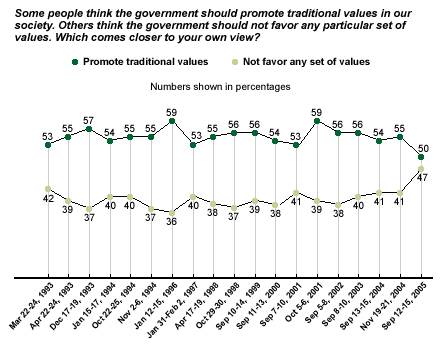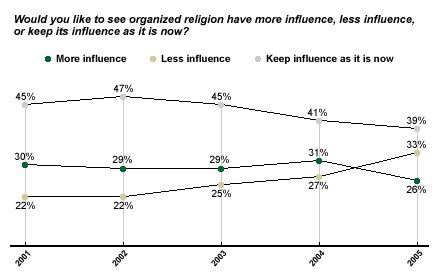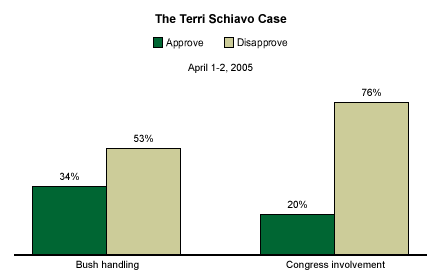For the last decade, a majority of Americans have believed government should promote traditional values, rather than not favor a particular set of values. But a recent poll finds the public is now split on the issue.
In a Sept. 12-15 ���۴�ýPoll*, 50% of Americans say they think the government should promote traditional values, a drop from the mid-to-upper 50% range typically seen in results for this question over the last 12 years. Forty-seven percent of Americans now think the government shouldn't favor a particular set of values, the highest percentage ���۴�ýhas recorded for this response to date (the previous high was 42% back in 1993).

Why might we be seeing such a change at this point in time? It may reflect a general ebbing in Americans' desire for institutions to push certain values on U.S. society. For the first time since ���۴�ýbegan asking the question in 2001, more Americans said in January this year** that they want to see organized religion have less influence, rather than more influence. This finding comes on the heels of the 2004 presidential campaigns, in which moral values were an election issue.

Backlash Effect?
The change may also be a more specific backlash caused by the current political climate. "Traditional values" mean different things to different people; for some, the words are synonymous with conservative religious views, which are often associated with the Republican Party. Favorability ratings for the Republican Party in general, and job approval ratings of a Republican-controlled Congress and Republican presidency, aren't in positive territory.
In the values arena, Congress incurred public disapproval last spring as Republican members pushed through emergency legislation in an attempt to keep the brain-damaged Terri Schiavo alive. In early April***, 53% of Americans disapproved of the president's handling of the Schiavo case, and 76% disapproved of Congress' involvement.

With approval ratings of the president and Congress at low points, more Americans may feel the government needs to clean up its own act before it can be trusted to promote values representative of all Americans.
*These results are based on telephone interviews with a randomly selected national sample of 921 adults, aged 18 and older, conducted Sept. 12-15, 2005. For results based on this sample, one can say with 95% confidence that the maximum error attributable to sampling and other random effects is ±4 percentage points. In addition to sampling error, question wording and practical difficulties in conducting surveys can introduce error or bias into the findings of public opinion polls.
The sample for this survey did not include the areas of Louisiana and Mississippi that were declared federal disaster areas following Hurricane Katrina. This accounts for about less than 1% (0.75%) of the U.S. adult population.
**Results are based on telephone interviews with 1,005 national adults, aged 18 and older, conducted Jan. 3-5, 2005. For results based on the total sample of national adults, one can say with 95% confidence that the maximum margin of sampling error is ±3 percentage points.
***Results are based on telephone interviews with 1,040 national adults, aged 18 and older, conducted April 1-2, 2005. For results based on the total sample of national adults, one can say with 95% confidence that the maximum margin of sampling error is ±3 percentage points.
